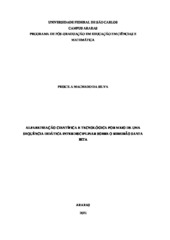| dc.contributor.author | Silva, Priscila Machado da | |
| dc.date.accessioned | 2022-09-22T15:16:19Z | eng |
| dc.date.available | 2022-09-22T15:16:19Z | eng |
| dc.date.issued | 2022-07-01 | eng |
| dc.identifier.citation | SILVA, Priscila Machado da. Alfabetização científica e tecnológica por meio de uma sequência didática interdisciplinar sobre o Ribeirão Santa Rita. 2022. Dissertação (Mestrado em Educação em Ciências e Matemática) – Universidade Federal de São Carlos, Araras, 2022. Disponível em: https://repositorio.ufscar.br/handle/ufscar/16651. | * |
| dc.identifier.uri | https://repositorio.ufscar.br/handle/ufscar/16651 | por |
| dc.description.abstract | One of the natural goods that is born and cuts through the city of Fernandópolis/SP is the Ribeirão Santa Rita, which, despite starting in this municipality, only ends when it flows to the waters of Rio Grande that divides the states of São Paulo and Minas Gerais. Thus, based on science and technology that is present in the daily of the whole society, this present work aims to investigate how a regional theme (Ribeirão Santa Rita) can contribute to promote the Scientific and Technological Literacy of high school students, through a didactic sequence. Thus, through dissemination on social networks, students went invited to participate in the "Workshop on Science and citizenship: Ribeirão Santa Rita", that happened remotely. This workshop was structured using an interdisciplinary didactic sequence based on the three pedagogical moments. It was evaluated about the Scientific and Technological Literacy of the students, using the Discursive Textual Analysis, so that the corpus selected for the analysis was categorized according to historical context of the city, relationship with everyday life, health and environment, business interests and theoretical concepts. Subsequently, it was evaluated each of these categories according to the criteria of ACT proposed for Bocheco (2011). In this way, it was possible to verify that the workshop
contributed to the Pratical, Civic and Professional or Economical Scientific Literacy of the students. The category where Bocheco's (2011) indicator were less evident was: "historical context of the city", while in the "health and environment" category, the Civic Scientific Literacy indicator showed great evidence. | eng |
| dc.description.sponsorship | Outra | por |
| dc.language.iso | por | por |
| dc.publisher | Universidade Federal de São Carlos | por |
| dc.rights | Attribution-NonCommercial-NoDerivs 3.0 Brazil | * |
| dc.rights.uri | http://creativecommons.org/licenses/by-nc-nd/3.0/br/ | * |
| dc.subject | Temas regionais | por |
| dc.subject | Sequência didática | por |
| dc.subject | Alfabetização científica e tecnológica | por |
| dc.subject | Regional themes | eng |
| dc.subject | Didactic sequence | eng |
| dc.subject | Scientific and technological literacy | eng |
| dc.title | Alfabetização científica e tecnológica por meio de uma sequência didática interdisciplinar sobre o Ribeirão Santa Rita | por |
| dc.title.alternative | Scientific and technological literacy through an interdisciplinary didactic sequence about the Ribeirão Santa Rita | eng |
| dc.type | Dissertação | por |
| dc.contributor.advisor1 | Milaré, Tathiane | |
| dc.contributor.advisor1Lattes | http://lattes.cnpq.br/4030661520659155 | por |
| dc.description.resumo | Um dos bens naturais que nasce e corta a cidade de Fernandópolis/SP é o Ribeirão Santa Rita, que apesar de começar neste município, somente termina ao desaguar nas águas do Rio Grande que divide os Estados de São Paulo e Minas Gerais. Desse modo, baseado na ciência e tecnologia que está presente no cotidiano de toda a sociedade, o presente trabalho tem como objetivo investigar como um tema regional (Ribeirão Santa Rita) pode contribuir para promover a Alfabetização Científica e Tecnológica de estudantes de Ensino Médio, por meio de uma sequência didática realizada de forma remota. Dessa forma, através de divulgações em redes sociais, os estudantes foram convidados a participar da “Oficina sobre ciência e cidadania: Ribeirão Santa Rita”. Essa oficina foi estruturada utilizando como método uma sequência didática interdisciplinar baseada nos três momentos pedagógicos. Avaliou-se acerca da Alfabetização Científica e Tecnológica dos estudantes, utilizando a Análise Textual Discursiva, de modo que o corpus selecionado para a análise foi categorizado de acordo com: contexto histórico da cidade, relação com o cotidiano, saúde e meio ambiente, interesses empresariais e conceitos teóricos. Posteriormente, avaliaou-se cada uma dessas categorias segundo os critérios de ACT propostos por Bocheco (2011). Dessa forma, foi possível constatar, que a oficina contribuiu para a Alfabetização Científica Prática, Cívica e Profissional ou Econômica dos estudantes. A categoria onde os indicadores de Bocheco (2011) foram menos evidenciados foi: “contexto histórico da cidade”, enquanto na categoria “saúde e meio ambiente” o indicador Alfabetização Científica Cívica se mostrou com grande evidência. | por |
| dc.publisher.initials | UFSCar | por |
| dc.publisher.program | Programa de Pós-Graduação em Educação em Ciências e Matemática - PPGEdCM-Ar | por |
| dc.subject.cnpq | CIENCIAS HUMANAS::EDUCACAO::ENSINO-APRENDIZAGEM | por |
| dc.description.sponsorshipId | 9861/2020-43 | por |
| dc.publisher.address | Câmpus Araras | por |
| dc.contributor.authorlattes | http://lattes.cnpq.br/8228509234989162 | por |


